
James O'Brien 10am - 1pm
8 November 2023, 17:39 | Updated: 11 November 2023, 10:15
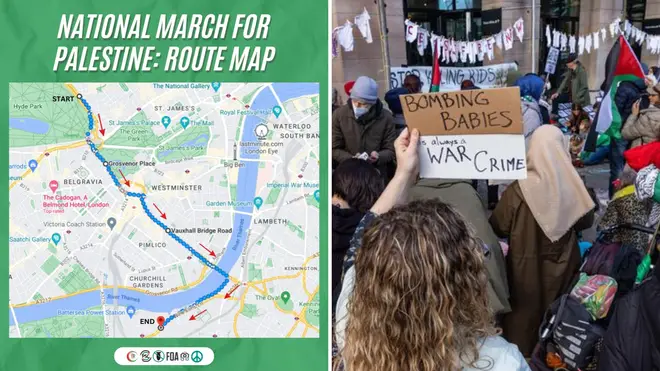
The full route for the pro-Palestine march in London on Armistice Day has been revealed.
The November 11 march, which has been controversial because it coincides with the day of solemn remembrance for Britain's war dead, will not go past the Cenotaph in Whitehall.
Follow our live blog covering the pro-Palestine protest here.
The closest it will come to the national war memorial will be about a mile away, when marchers go past Victoria Station.
The march will take place at midday, and will cover roughly three miles, ending up at the US embassy in Battersea.
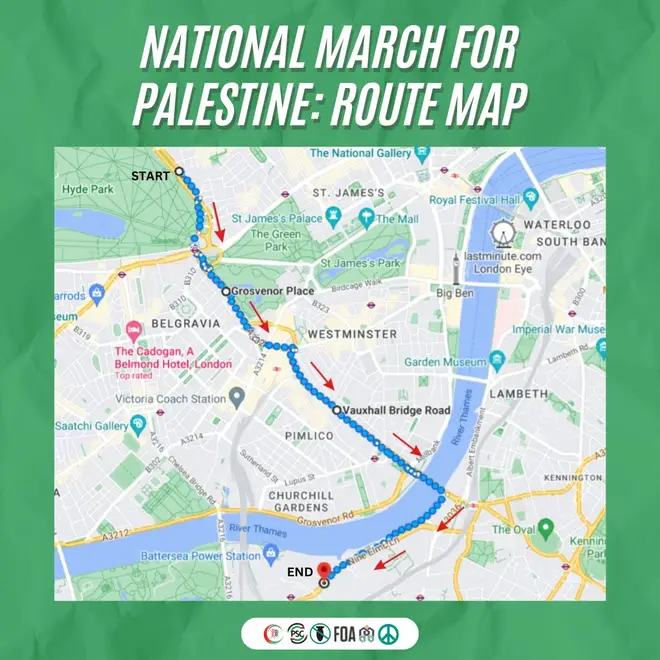
The route starts on the eastern side of Hyde Park about halfway up, with marchers then going south towards Hyde Park Corner.
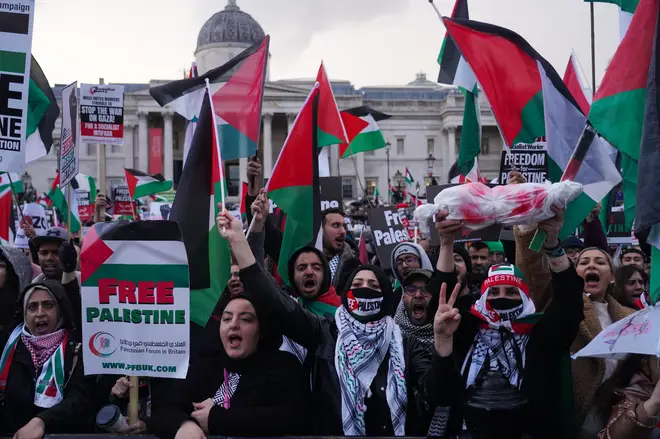
They will then go down Grosvenor Place, along the back of Buckingham Palace's grounds, before passing Victoria and walking down Vauxhall Bridge Road.
The protesters will then cross Vauxhall Bridge and turn south-west down the river, ending up at the embassy.
The route has been agreed in advance with the police. People coming to the march have been told to use Bond Street, Oxford Street and Hyde Park Corner Tube stations, as well as Marble Arch.
The protests have been going in London every Saturday since Hamas killed 1,400 people in Israel in a terror attack, and Israel responded. More than 10,000 people in Gaza have been killed in Israel's retaliatory bombardments and ground invasion of the territory.
The protesters are calling for a ceasefire, which Hamas has said it would not respect. Neither the British government nor the Labour party have advocated for a ceasefire, calling instead for 'humanitarian pauses' to help aid get into the strip and to try and free some of the 240 people Hamas took hostage in its terror attack.
Rishi Sunak held a meeting with Metropolitan police commissioner Sir Mark Rowley regarding the march on Wednesday. He said afterwards that the protest was "disrespectful" and "offends our heartfelt gratitude" to the people who gave their lies for British freedom.
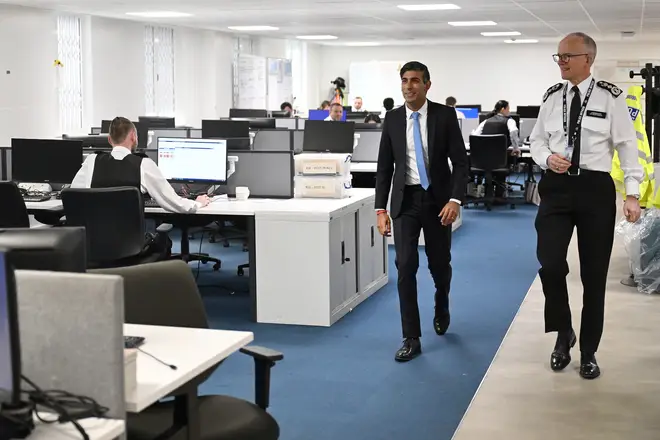
But the Prime Minister also said that those freedoms include the right to protest, "even if we disagree with them".
Sir Mark has resisted political pressure to try to block the protest.
He said on Tuesday that his force does not have enough intelligence to suggest there will be serious disorder, which would mean they could stop the protest going ahead.
But the Met did ask protesters to postpone the march - a request that organisers robustly declined.
Supporters say that calls for a ceasefire in Gaza are in the spirit of the Armistice, which marked the end of the First World War.

Foreign Secretary says Government favours ‘humanitarian pause’ over ceasefire
Raghad Altikriti of the Muslim Association of Britain told LBC earlier this week that "the banning of this protest would be dishonouring the memory of those who fought for freedom of speech, freedom of assembly."
The debate over whether or not Palestine activists should march on Armistice Day centres on the balance of civil liberties and respect for the British war dead. The previous marches have been loud and passionate, whereas Armistice Day is traditionally a solemn occasion of remembrance.
Police have been forced to make more than 100 arrests at the pro-Palestine marches in London, including some for anti-Semitic chanting. Two women who wore paraglider stickers in an apparent reference to the Hamas attacks were arrested on suspicion of inviting support for a proscribed organisation.
Others have been seen calling for 'jihad' and 'intifada'.
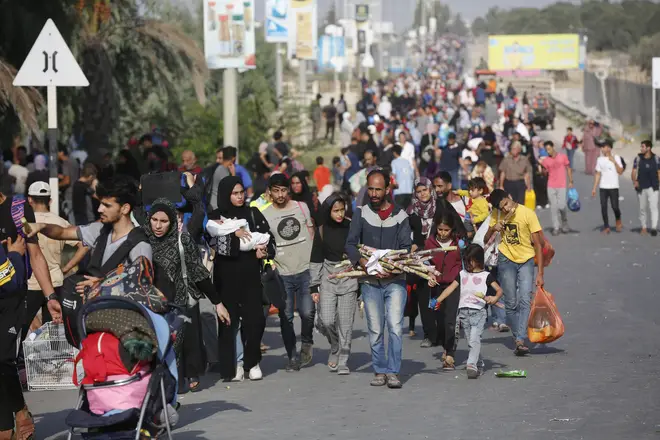
Mr Sunak said on Wednesday evening: "This weekend people around the UK will come together in quiet reflection to remember those who made the ultimate sacrifice for this country. It is not hyperbole to say that we are the beneficiaries of an inheritance born of their sacrifice.
“It is because that sacrifice is so immense, that Saturday’s planned protest is not just disrespectful but offends our heartfelt gratitude to the memory of those who gave so much so that we may live in freedom and peace today.
“But part of that freedom is the right to peacefully protest. And the test of that freedom is whether our commitment to it can survive the discomfort and frustration of those who seek to use it, even if we disagree with them. We will meet that test and remain true to our principles.
“This afternoon I asked the Metropolitan Police Commissioner, Sir Mark Rowley, to come to Downing Street and provide reassurances that the police are taking every step necessary to safeguard Remembrance services, provide reassurance to those who wish to pay their respects across the country and keep the public safe from disorder this weekend.
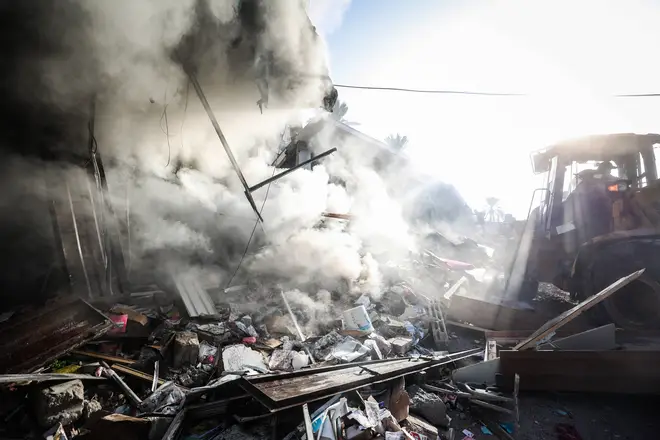
“It’s welcome that the police have confirmed that the march will be away from the Cenotaph and they will ensure that the timings do not conflict with any Remembrance events. There remains the risk of those who seek to divide society using this weekend as a platform to do so. That is what I discussed with the Metropolitan Police Commissioner in our meeting. The Commissioner has committed to keep the Met Police’s posture under constant review based on the latest intelligence about the nature of the protests.
“And finally, to our veterans and their families, I assure you that we will do everything it takes to protect this special weekend for you and our country, as we come together to reflect on those who protected our freedom.”